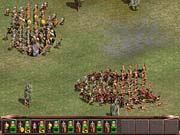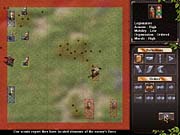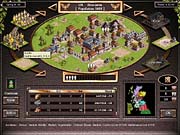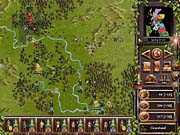Legion is the latest gaming foray into the classical civilization that gave us Julius Caesar and Caligula. This strategy game from Paradox Entertainment and Slitherine Software looks at early Roman history, featuring on four campaigns that focus on the conquest of Italy and expansion into Gaul and Britain. It features a real-time battlefield with 22 different units representing Rome and numerous barbarian tribes, epic gameplay with more than 20 AI factions competing with you for dominance of the map, and an economic model where you gather resources and build an empire. So, on paper, there's a lot to Legion. Yet once you start playing it, Legion seems stripped down. Everything seems to have been done on the cheap.

The game apparently wasn't created with the same "everything but the kitchen sink" philosophy that Paradox used in its recent games, the highly acclaimed Europa Universalis and its sequel. While those games overwhelmed players with events and personages taken straight out of the history books, this one employs a softer focus. Yes, you can fight Julius Caesar's Gallic Wars, but you don't get the chance to command as him on the battlefield. Nor will you get the opportunity to deal with authentic British tribal leaders of the first century when you cross the English Channel. Unit types are nicely varied and present a good cross section of what was available to the Romans and their barbarian adversaries, including legionaries, praetorians, hoplites, archers, and cavalry. Still, they're only rough approximations of the real thing, very similar to units found in any run-of-the-mill real-time strategy game. Legion is actually closer to traditional real-time strategy games like Command & Conquer than it is to a comprehensive survey of history like Europa Universalis.
In part because of this reliance on real-time strategy fundamentals, and in part because of a desire to re-create the actual conditions of ancient warfare, Legion comes up short in offering you a chance to make meaningful tactical decisions. Battles are rudimentary affairs that you begin by choosing a formation from a short list of a dozen types, all of which involve variants of an old-fashioned tank rush. You then issue orders telling your troops when and how to engage the enemy and sit back to see whether you win or lose. Nothing can be done once a battle gets underway. This is a somewhat accurate reenactment of how ancient generals were often incommunicado, though it doesn't fully take into account the remarkable communications systems employed by Roman armies along the frontiers of the Republic (and in the later imperial period). Also, battles in the ancient world typically lasted for quite some time, giving commanders the opportunity to issue new orders if things weren't going well. In Legion, armies clash together and a victor emerges within a minute or two.

But while it's disappointing that the developers chose not to model combat sequences after historical truths, it's even more of a letdown that they have turned the player into a spectator during the most exciting part of the game. Not being able to directly influence the outcome of a battle is at first frustrating, and later boring. There is some amount of tension when watching a battle, especially in the early moments, when you're waiting to see if the enemy will play into your hands, though the sheer number of engagements means that few battles will actually assume an air of importance. Opposing forces generally aren't all that bright, either. A little forethought and the use of a basic maneuver like staggering the advance of your formations so that you hit the enemy like a wave is typically all that's needed to crush any opponent. Unfortunately, your charges are just as dumb, and they'll often stick to orders, no matter how ill-advised. Order a short advance and hold, and your troops will do just that, even in the presence of a column of archers mere feet away, happily slaughtering the immobile targets.
The turn-based management part of the game is also mostly automatic. Conquered towns and cities grow at a steady pace, meaning that you usually have a sizable pool of citizens to build your armies from. Resources can be gathered pretty much anywhere you have a settlement, although there is some regard for the surrounding terrain. All you need to do to ensure a steady supply of food, wood, and ore is construct farms, lumber yards, and mines and assign peasants to operate them. Resources are shared throughout your empire, so there are no trade concerns. This makes for an easy-to-play game with no micromanagement, but as with the combat, things have been simplified a bit too much. There is a limited number of building types, and there is no research ability that would allow you to develop new ones. Showing the Romans and their tribal enemies as uninterested in technology may very well be accurate, though it certainly makes for a dull game when you're erecting the same buildings over and over again. At the very least, Legion could have allowed you to research military advancements that would allow the production of different weapon types, armor, and fighting strategies.

All this streamlining means that relatively few momentous decisions need to be made during the course of a campaign. You build towns, gather the resources needed to recruit soldiers, and conquer neighbors in such a formulaic fashion that the game seems to be rolling forward on wheels. Enemy forces generally start off inferior to Rome, so they often turtle and sit idle, waiting for an attack or a diplomatic approach (which come in handy when the potential is there to be waging war on more than one front). Others go on the offensive at inappropriate times. Campaign play can be somewhat spiced up by taking control of an enemy tribe, though the gameplay doesn't change much whether you're ruling the Romans or the Celtiberians. Besides, most of the tribes are faceless entities that most people have never heard of, much less been interested in playing as in a strategy game. It's only interesting to switch roles and fight against Rome in the Unification of Italy campaign, due to the challenge involved in trying to change history. And when you're done with the four campaigns, you're done with Legion. There is no skirmish mode to play set-piece battles in--a real disappointment, considering some of the almost legendary Roman engagements that could have been depicted--and no multiplayer option.
Paradox and Slitherine also seem to have forgotten to finish the graphics. Legion's production values just don't match what's on display in the Europa Universalis series, a bad sign when you consider that those games were two years out of date on the days that they were launched. Though the campaign map features fairly attractive 2D visuals that include accurate geographic features and landmarks such as England's Stonehenge, and the user interface screens are clean and intuitive, the battlefield sequences are terrible. Background terrain is composed of a limited number of tiles depicting grassland and other generic features, making each battle look the same as the last. Units are tiny multicolored blobs with indistinguishable features and virtually no detail. Even after many hours spent with the game, it's difficult to tell one type of soldier from another. The audio is similarly anonymous. The score is composed of lightweight Enya-style tunes, and the in-game effects are little more than birds chirping and gruff soldiers shouting entertaining Latin responses to your commands.

At its heart, Legion is nothing more than Europa Universalis Lite. The shallow combat system and unsophisticated management features have clearly been aimed at people who like the idea of a comprehensive historical strategy game, but not the reality. Paradox and Slitherine went too far in their efforts to simplify the gameplay. Though Legion doesn't have a lot of extraneous details, it also lacks the essential elements that make strategy games with authentic settings so appealing. A historical game about conquest and empire building can't have a combat engine that runs largely on autopilot, a management engine that features very little to actually build, and a series of campaigns that consciously ignore important figures and events. Still, Legion isn't so much a bad game as it is a rather dull one that doesn't quite know what it wants to be.